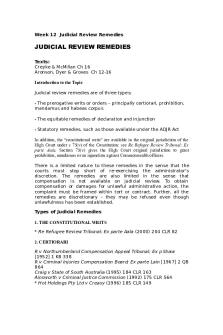Statins - lecture notes PDF

| Title | Statins - lecture notes |
|---|---|
| Course | Pharmacy |
| Institution | University of Nottingham |
| Pages | 3 |
| File Size | 168.5 KB |
| File Type | |
| Total Downloads | 64 |
| Total Views | 957 |
Summary
Statins inhibit the action of HMG-CoA reductase, the rate-limiting enzyme in hepatic cholesterol synthesis.Adverse effects myopathy: includes myalgia, myositis, rhabdomyolysis and asymptomatic raised creatine kinase. Risks factors for myopathy include advanced age, female sex, low body mass index a...
Description
Statins inhibit the action of HMG-CoA reductase, the rate-limiting enzyme in hepatic cholesterol synthesis. Adverse effects
myopathy: includes myalgia, myositis, rhabdomyolysis and asymptomatic raised creatine kinase. Risks factors for myopathy include advanced age, female sex, low body mass index and presence of multisystem disease such as diabetes mellitus. Myopathy is more common in lipophilic statins (simvastatin, atorvastatin) than relatively hydrophilic statins (rosuvastatin, pravastatin, fluvastatin) liver impairment: the 2014 NICE guidelines recommend checking LFTs at baseline, 3 months and 12 months. Treatment should be discontinued if serum transaminase concentrations rise to and persist at 3 times the upper limit of the reference range there is some evidence that statins may increase the risk of intracerebral haemorrhage in patients who've previously had a stroke. This effect is not seen in primary prevention. For this reason the Royal College of Physicians recommend avoiding statins in patients with a history of intracerebral haemorrhage
Contraindications
macrolides (e.g. erythromycin, clarithromycin) are an important interaction. Statins should be stopped until patients complete the course pregnancy
Who should receive a statin?
all people with established cardiovascular disease (stroke, TIA, ischaemic heart disease, peripheral arterial disease) following the 2014 update, NICE recommend anyone with a 10-year cardiovascular risk >= 10% patients with type 2 diabetes mellitus should now be assessed using QRISK2 like other patients are, to determine whether they should be started on statins patients with type 1 diabetes mellitus who were diagnosed more than 10 years ago OR are aged over 40 OR have established nephropathy
Statins should be taken at night as this is when the majority of cholesterol synthesis takes place. This is especially true for simvastatin which has a shorter half-life than other statins.
NICE currently recommends the following for the prevention of cardiovascular disease::
atorvastatin 20mg for primary prevention o increase the dose if non-HDL has not reduced for >= 40% atorvastatin 80mg for secondary prevention
Direct renin inhibitors
e.g. Aliskiren (branded as Rasilez) by inhibiting renin blocks the conversion of angiotensinogen to angiotensin I no trials have looked at mortality data yet. Trials have only investigated fall in blood pressure. Initial trials suggest aliskiren reduces blood pressure to a similar extent as angiotensin converting enzyme (ACE) inhibitors or angiotensin-II receptor antagonists adverse effects were uncommon in trials although diarrhoea was occasionally seen only current role would seem to be in patients who are intolerant of more established antihypertensive drugs...
Similar Free PDFs

Statins - lecture notes
- 3 Pages

Lecture notes, lecture 3
- 5 Pages

Lecture notes, lecture Subspaces
- 21 Pages

Lecture notes, lecture 14
- 3 Pages

Lecture notes, lecture 6
- 3 Pages

Lecture notes, lecture 7b
- 4 Pages

Lecture notes, lecture 13
- 12 Pages

Lecture notes, lecture 12
- 9 Pages

Lecture notes, lecture all
- 62 Pages

Lecture notes- Lecture 1
- 20 Pages

Lecture notes, lecture Logarithms
- 13 Pages
Popular Institutions
- Tinajero National High School - Annex
- Politeknik Caltex Riau
- Yokohama City University
- SGT University
- University of Al-Qadisiyah
- Divine Word College of Vigan
- Techniek College Rotterdam
- Universidade de Santiago
- Universiti Teknologi MARA Cawangan Johor Kampus Pasir Gudang
- Poltekkes Kemenkes Yogyakarta
- Baguio City National High School
- Colegio san marcos
- preparatoria uno
- Centro de Bachillerato Tecnológico Industrial y de Servicios No. 107
- Dalian Maritime University
- Quang Trung Secondary School
- Colegio Tecnológico en Informática
- Corporación Regional de Educación Superior
- Grupo CEDVA
- Dar Al Uloom University
- Centro de Estudios Preuniversitarios de la Universidad Nacional de Ingeniería
- 上智大学
- Aakash International School, Nuna Majara
- San Felipe Neri Catholic School
- Kang Chiao International School - New Taipei City
- Misamis Occidental National High School
- Institución Educativa Escuela Normal Juan Ladrilleros
- Kolehiyo ng Pantukan
- Batanes State College
- Instituto Continental
- Sekolah Menengah Kejuruan Kesehatan Kaltara (Tarakan)
- Colegio de La Inmaculada Concepcion - Cebu




